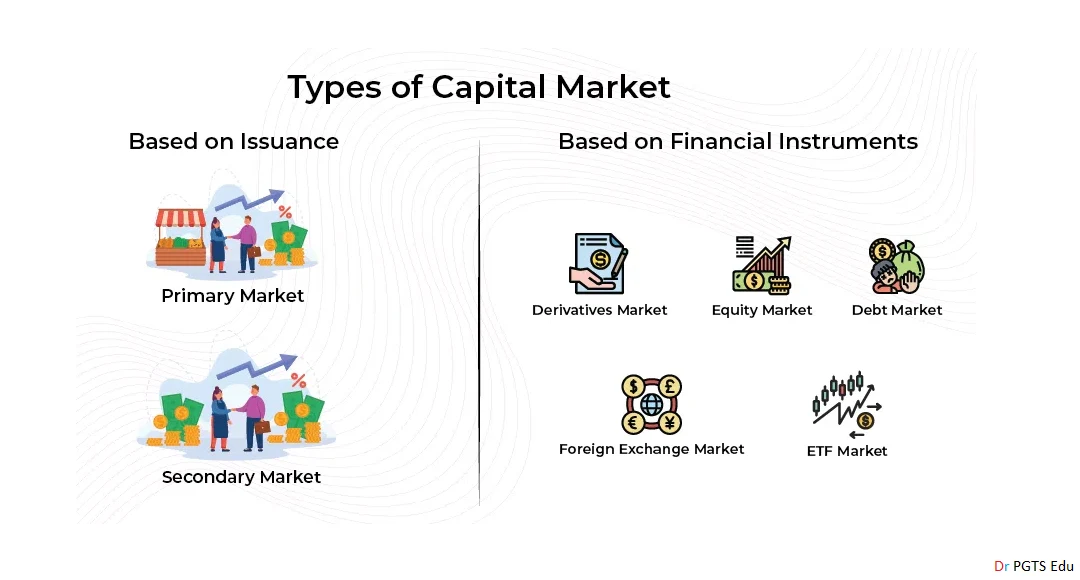Capital markets play a crucial role in a country’s economic growth and offer vast opportunities for individuals and businesses to build wealth. Whether you’re a beginner investor or an experienced trader, understanding capital markets can help you make informed financial decisions. This article will explain the meaning, features, types, functions, merits, and demerits of capital markets, with a special focus on the Indian capital markets.
Capital Markets
Capital markets are financial markets where buyers and sellers engage in the trade of financial securities such as stocks, bonds, and derivatives. These markets enable businesses and governments to raise long-term funds and provide investors with opportunities to grow their wealth. Capital markets are essential for the proper functioning of an economy, as they facilitate the flow of money between savers and borrowers.
Features of Capital Markets
- Long-term Investment Opportunities: Capital markets deal primarily with long-term securities, helping investors and businesses achieve their financial goals over extended periods.
- Liquidity: Investors can buy or sell securities easily, ensuring smooth capital flow.
- Regulated Environment: Regulatory bodies such as SEBI (Securities and Exchange Board of India) ensure transparency and fairness in the market.
- Risk and Return: Investments in capital markets come with varying degrees of risk, but they also offer higher returns compared to other financial markets.
- Diverse Instruments: Capital markets provide a range of financial instruments, including equity, bonds, mutual funds, and derivatives.
- Market Efficiency: Information in capital markets is quickly reflected in security prices, ensuring fair trading opportunities.
Types of Capital Markets
Capital markets are broadly categorized into two types:
Primary Market
This is where new securities are issued and sold for the first time. Companies raise funds by offering shares to the public through Initial Public Offerings (IPOs). The primary market ensures that businesses have access to capital for growth and expansion.

Secondary Market
In the secondary market, previously issued securities are traded among investors. Stock exchanges like the Bombay Stock Exchange (BSE) and the National Stock Exchange (NSE) in India provide a platform for this trading. The secondary market enhances liquidity and allows investors to enter or exit investments easily.
Capital Markets Functions
- Mobilization of Savings: Capital markets channel savings from individuals and institutions into productive investments, boosting economic growth.
- Wealth Creation: Investors can grow their wealth through stock appreciation, dividends, and interest earnings.
- Corporate Growth: Businesses raise capital for expansion, acquisitions, and technological advancements.
- Price Determination: Demand and supply dynamics in capital markets determine the prices of securities.
- Risk Distribution: Capital markets distribute risk among investors with different risk appetites.
- Economic Development: Efficient capital markets support national economic stability and progress.
Merits of Capital Markets
- Investment Opportunities: Capital markets offer a range of investment options, catering to different risk preferences.
- Wealth Accumulation: Long-term investments in equities and bonds can generate substantial returns.
- Economic Growth: A well-functioning capital market boosts the economy by facilitating investment in businesses.
- Efficient Resource Allocation: Capital is directed toward the most promising businesses and projects, enhancing overall productivity.
- Liquidity: Investors can easily buy and sell securities, ensuring flexibility in managing their investments.
Demerits of Capital Markets
- Market Volatility: Prices of securities fluctuate due to various factors, leading to potential losses.
- Risk of Fraud: Despite regulatory oversight, fraudulent activities such as insider trading and market manipulation exist.
- Complexity: Understanding capital markets requires financial knowledge, which can be a barrier for beginners.
- Economic Dependence: Capital markets are influenced by economic conditions, political stability, and global events, making them unpredictable.
Indian Capital Markets
India has a well-developed capital market system that plays a vital role in the country’s economic development. The Indian capital market consists of:
1. Stock Exchanges:
Bombay Stock Exchange (BSE) – Established in 1875, it is Asia’s oldest stock exchange.
National Stock Exchange (NSE) – India’s largest stock exchange, known for its electronic trading system.
2. Regulatory Body:
Securities and Exchange Board of India (SEBI): SEBI regulates the capital market, ensuring transparency, investor protection, and market stability.
3. Major Participants:
Retail and institutional investors
Foreign institutional investors (FIIs)
Mutual funds and hedge funds
Public and private sector companies
4. Investment Avenues:
Equities, bonds, derivatives, and mutual funds are popular investment choices in India.
Government initiatives like the Sovereign Gold Bond Scheme and Infrastructure Investment Trusts (InvITs) offer additional investment opportunities.
Capital markets are a powerful tool for wealth creation and economic development. By understanding their structure, functions, and opportunities, investors can make informed decisions to maximize their returns. The Indian capital market, with its well-established stock exchanges and regulatory framework, offers ample investment avenues for individuals and businesses. However, market participants must carefully assess risks and conduct thorough research before investing to ensure long-term financial growth.
Read also: Service marketing secrets how to attract and retain loyal customers

